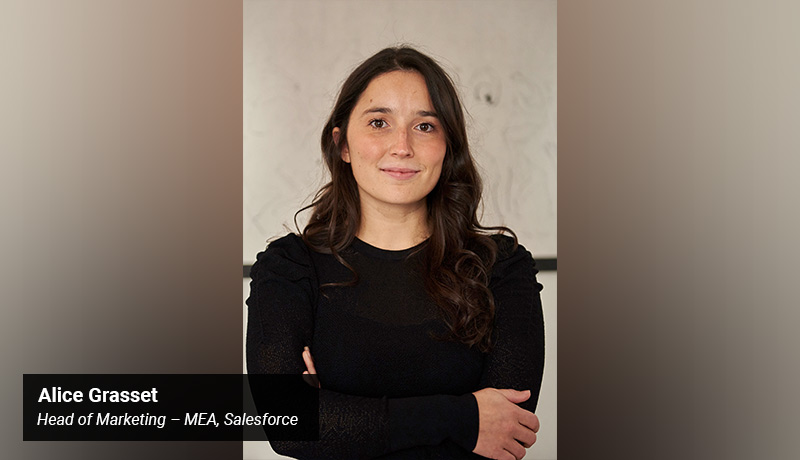
By Alice Grasset, Head of Marketing – Middle East and Africa, Salesforce
Against the backdrop of the COVID-19 pandemic, we are also confronting a crisis of inequality. Women and girls still face discrimination, still have unequal access to education or health care, and are still likely to be underpaid.
According to the World Economic Forum (WEF), none of us will see gender parity in our lifetimes, and nor likely will many of our children. Given that the pandemic has disproportionately negatively impacted women, this gap only looks set to widen.
It’s appropriate that the UN theme of International Women’s Day (IWD) on 8 March is “Women in leadership: Achieving an equal future in a COVID-19 world”. Everyone benefits when women and girls are treated equally. It’s a global goal all of us can and should be working toward, including in our businesses and workplaces. On International Women’s Day, we should celebrate what women have accomplished. We should also take this opportunity to reflect on what steps businesses are taking – and can take – to advance gender equality and afford greater leadership opportunities.
According to the WEF report there are three primary reasons for persistent levels of gender inequality. Firstly, women have greater representation in roles that are being automated. Secondly, women face the persistent problem of insufficient care infrastructure and access to capital. Thirdly, not enough women are entering professions where wage growth is the most pronounced. The corporate world is an example where women continue to be significantly underrepresented. For example, among Middle East companies listed on stock markets, only 9.5 percent of board seats are held by women, according to a recent report by Deloitte.
New barriers to women’s economic participation and leadership have emerged during the pandemic. We’ve seen, for instance, women shoulder an even larger burden of child-rearing responsibilities at home, creating a disproportionately negative impact on their advancement in the workplace. According to McKinsey estimates, female job loss rates have been about 1.8 times higher than male job loss rates globally. Although flexible working arrangements have the potential to offer greater life-work balance, if not implemented with care these changes put at risk hard-won progress in the fight for pay and workplace equity.
The greatest challenge is addressing women’s under-representation in emerging roles, such as cloud computing, engineering and Data and AI. With a focus on improving skills and reskilling, workforce strategies must ensure that women are better equipped to overcome challenges and take advantage of the opportunities that the digital economy offers. Widening participation is one thing, providing opportunities to lead is another. To truly advance gender equality, we must consider the entire employee lifecycle, starting from how we attract and recruit talent, to how we invest in development.
Creating a culture of equality isn’t just the right thing to do; it’s also the smart thing. Studies have shown time and again that a diverse workplace is a more profitable one. Adopting diverse hiring practices, and training programs that mitigate biases, connects companies with candidates they might not have otherwise been introduced to. Where women have taken time away from their career, business has a responsibility to support them in their journey back to work. Everything we do must be underpinned by a commitment to equal pay for equal work.
To truly build a workplace that looks like society, women need to be represented at every level, particularly on corporate boards and C-Suite positions. This requires supporting women at all stages of their careers, through investment in leadership development programs and inclusive promotions processes. Fairness in treatment, equal opportunity, recognition of success and amplification of visibility will bring more women to the decision-making table and inspire more to rise from the ranks. In this all-digital work-from-anywhere world we now live in, businesses have an even greater responsibility to create an equal, fair and inclusive environment that translates both in-office and virtually.
Inequality is everyone’s responsibility. As economies emerge from the pandemic, we must use this opportunity to create a better workplace, provide meaningful jobs, and prioritise reskilling initiatives so that all underrepresented groups can thrive. Business can be the greatest platform for positive change in this regard – advocating for, investing in and helping more women to take up roles of leadership. Together, we create a more inclusive society than we had before, where everyone feels seen, heard, and valued.